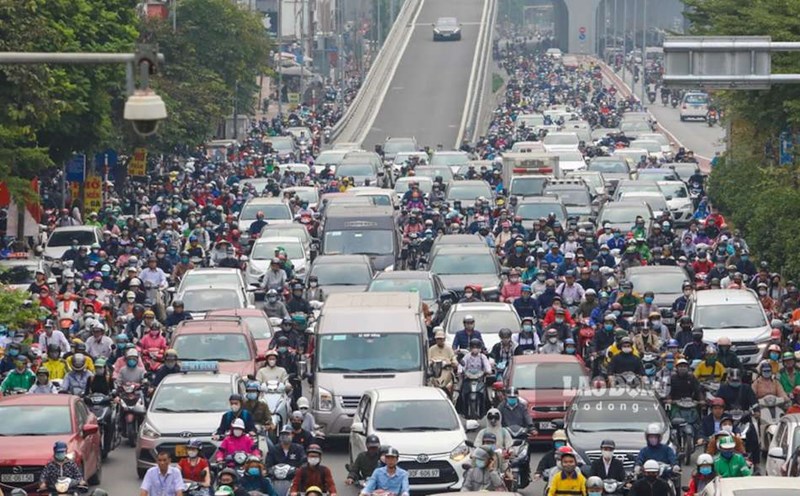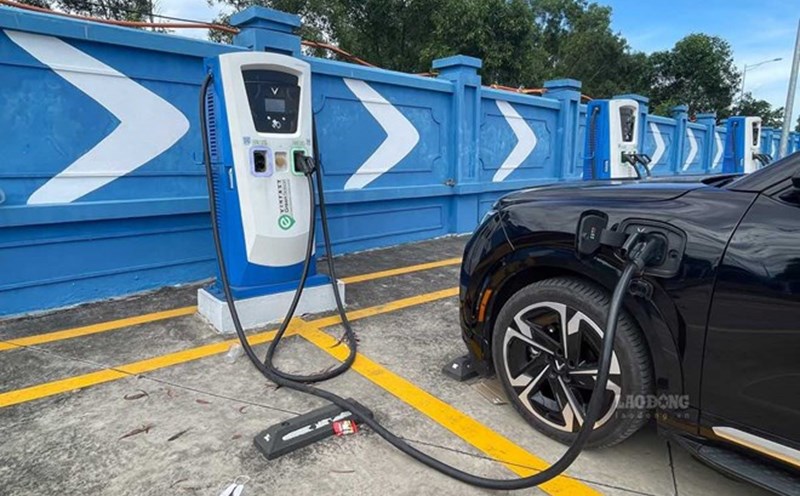The Hanoi Department of Construction has just reported to the City People's Committee on the conversion of green means of transportation and electric vehicle charging station infrastructure in the area.
The Department of Construction said that it has sent documents to relevant departments, branches and units to collect comments on the draft Resolution on converting green vehicles and developing charging stations of the City People's Council.
The draft is in the process of being finalized to submit to the City People's Committee to report to the People's Council for consideration and approval at the September 2025 meeting, under the direction of the City People's Committee and People's Council.
Some outstanding policies in the draft Resolution include: Direct financial support for people with gasoline or diesel motorbikes (registered before the Resolution takes effect) in low-emission zones, when switching to green vehicles (worth from 15 million VND or more).
The support level is 3 million VND/vehicle for normal individuals; 4 million VND/vehicle for near-poor households; 5 million VND/vehicle for poor households. Each individual is supported with a maximum of 1 vehicle until the end of 2030.
Support preferential loans with interest rates from 3-5%/year, a limit of 100% of contract value, a maximum loan term of 5 years for public service units; Passenger transport units (except buses) and freight transport; Enterprises investing in facilities to recover and recycle used vehicles.
Exemption from 100% of registration fees and license plate registration fees for green vehicles from the effective date of the Resolution until the end of 2030.
The Hanoi Department of Construction also proposed a pilot roadmap and expanded the area where private vehicles are prohibited from running on gasoline/diesel. Accordingly, the pilot limitation for gasoline-powered motorbikes is from January 1, 2026 to June 30, 2026;
No more motorbikes using fossil fuels will circulate in Ring Road 1 from July 1, 2026, in Ring Road 2 from January 1, 2028.
Limit personal cars using gasoline/diesel in Ring Road 2 from January 1, 2028; Expand to Ring Road 3 from January 1, 2030.
From 2035 - 2050, limit motor vehicles that are not green vehicles (including CNG and hybrid vehicles) at each level.
Accordingly, there will be restrictions in Ring Road 1 from 2035, in Ring Road 2 from 2040, in Ring Road 3 from 2045 and the entire city from 2050.
The city will also collect traffic fees and adjust the price of parking services to apply according to the above roadmap for polluting vehicles; Strengthen supervision and penalties: Hanoi will install surveillance cameras and organize patrols and controls.
Violations of emissions or entering prohibited areas will be subject to high administrative penalties (maximum 2 times the current regulations).
Incentives for investment in charging station infrastructure
To ensure the implementation of the above goal, Hanoi requires at least 10% of parking spaces at existing projects with charging stations before the end of 2026; At least 30% of parking spaces in new projects must have charging stations.
The budget will support public charging station infrastructure investment projects with 70% interest on bank loans in the first 5 years. The bus station and parking lot project with 30% parking space with charging stations is supported with 50% of site clearance costs; 100% of land rent in the first 5 years.
Hanoi will also prioritize investing in charging stations on sidewalks, encouraging the installation of hydrogen charging stations and clean fuel.
Notably, Hanoi strongly encourages investors to participate in developing clean energy transport infrastructure through PPP. These investors will be given priority for land allocation and 100% of land rent support at planned locations until the end of 2033.
The city is also committed to investing in synchronous transportation and technical infrastructure to effectively connect with clean energy station projects. In parallel with the above policies, the Department of Construction will also supplement specific processes and procedures for beneficiaries of incentives and support, avoiding the situation where policies are issued but not implemented effectively in practice.











